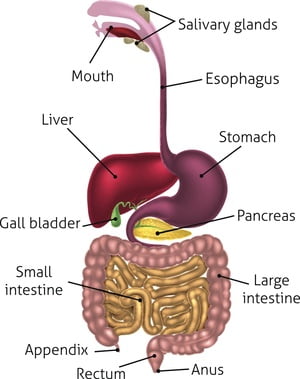The Importance of a Healthy Gut.
The human gastrointestinal system is one of the body’s most complicated and crucial structures.
Its role in human health and disease extends far beyond food digestion.
But what is the gastrointestinal system?
The gastrointestinal system comprises the alimentary canal (which includes your esophagus, stomach, small intestine, and large intestine), liver, salivary glands, gallbladder, pancreas, and other structures.
The Importance of a Healthy Gut
What are the Key Roles of the Human Gastrointestinal System?
1. Digestion of Food and Nutrient Metabolism
Digestion is important because it helps break down complex food structures into simpler and absorbable molecules like fatty acids, amino acids, and glucose.
The digestion process starts when you sense food visually or by smell.
Then, inside your mouth, the chewing action breaks down large food particles into smaller particles and mixes them with your saliva.
Saliva contains enzymes that start breaking down food sugars.
The food bolus then moves through the rest of the digestive system through rhythmic contraction motions called ‘peristalsis.’ In the stomach, stomach acid acts on the proteins to break them down into peptides.
Into the small and large intestines, the food mixes with several secretions containing digestive enzymes.
The end product is your food turning into simpler molecules like glucose, amino acids, and fatty acids.
These molecules then get absorbed into the blood and reach each body cell.
So, the gut is the body’s powerhouse, and the whole body will collapse if it doesn’t function properly.
The digestive system is home to a diverse population of bacteria, friendly viruses, and fungi.
Together, these make the gut microbiota.
The gut microbiota contains more than 100 trillion organisms.
More organisms are inside your gut than the total number of human cells combined.
The gut microbiota helps digest the food and gives away short-chain fatty acids (SCFA) such as butyrate, propionate, and acetate.
These SCFAs provide energy to human cells (1).
Bacteria such as Bacteroides thetaiotaomicron help in the breakdown of lipids (2).
The gut microbiota helps in the transport of amino acids across the gut and also helps convert them into active metabolites.
For example, bacteria help convert L-histidine to histamine and glutamate to γ-amino butyric acid (GABA) (3). Additionally, the gut microbiota helps synthesize compounds such as vitamin K and linoleic acid (4).
2. Immune Mediation
The human gut is one of the interfaces of the body. In other words, it acts as a barrier between the outside environment and the inside of your body.
You ingest countless bacteria, viruses, and other harmful organisms daily. But you don’t fall ill daily. Ever wondered why? The answer lies in your gut defense mechanisms.
First, your gut cells are tightly packed and only allow selective materials to pass through.
It is the ‘gut mucosal barrier’.
In addition to this physical barrier, the gut contains a variety of cells and chemicals that prevent harmful organisms from attaching, replicating, and gaining entry into the bloodstream.
The gut microbiota also actively competes with harmful bacteria for survival and growth.
They block off their access to nutrients needed for survival.
Research also suggests that the gut microbiota produces antimicrobial proteins (AMP) that help kill harmful bacteria and viruses (5).
3. Gut-Brain Axis
This may sound crazy, but there is a profound link between your gut and your brain.
It is called the ‘gut-brain axis.’ How your brain works largely depends on your gut health.
Here is how this system works.
The vagus nerve is a long nerve that directly connects your brain to your gut.
Have you ever wondered why you get goosebumps when you’re excited or anxious?
That’s your vagus nerve at play (6).
Another way your gut links to your brain is through several chemicals called neurotransmitters.
For instance, serotonin is the main neurotransmitter that gives a feeling of happiness. Your gut cells and the gut microbiome are the primary sources of serotonin (7).
Another way the gut controls your brain health is by regulating neuroinflammation and the supply of nutrients to your brain.
Researchers have noticed a significant alteration in gut microbiota levels, such as a decline in the levels of bifidobacterium species, in individuals with dementia.
Researchers believe this alteration causes an accelerated deposition of inflammatory proteins, called amyloids, in the brain (8).
Also, gut microbiota produces chemicals called ‘short-chained fatty acids (or SCFAs)’ that provide energy for the brain cells. The alteration of gut microbiota in conditions like Alzheimer’s causes a decline in the level of these metabolites. This causes a decline in the active functioning of the brain (8).
4. Role in Athletic Performance
Your gut has a profound effect on athletic and sports performance. As mentioned, your gut helps in nutrient digestion and metabolism. Without a properly functioning gut, all the valuable supplements will make no difference.
Also, your gut microbiota helps turn complex carbohydrates, fats, and proteins into SCFAs. SCFAs act as a readily available energy source, especially during intense workouts (9).
A healthy gut health and gut microbiome help improve your mental well-being by promoting a feeling of well-being. A healthy and strong mind can help you stay focused during your workout routine.
Research also suggests that intense workouts cause a dramatic rise in inflammatory chemicals like cytokines and Tumor Necrosis Factor (TNF).
These inflammatory chemicals create a state where the immune system gets suppressed and makes your body vulnerable.
The gut microbiota helps curb the inflammation and oxidative stress produced by an intense workout.
In other words, the gut microbiota helps close the ‘open window’ of impaired immunity resulting from an intense workout (10).
Dehydration during workouts is a real problem.
It can hamper gains and prolong recovery.
Your gut works extra hard to regulate the electrolytes and water content levels in your body.
Also, a healthy gut microbiota helps strengthen the gut barrier and prevents excessive loss of electrolytes and water resulting from exercise (10).
5. Additional Roles of the Gastrointestinal System
Other roles of the gastrointestinal system include:
● Research suggests that a healthy gut helps improve brain dopamine and serotonin levels, which can promote sleep quality and duration (11).
● The gut releases hormones like ghrelin and leptin that help regulate appetite.
● The pancreas releases hormones like insulin that helps regulate blood sugar levels.
● The secretions from the gallbladder help digest fats in the food properly.
As you can see, a healthy gut is paramount for your health and well-being, and that’s why taking good care of it by consuming nourishing foods and supplements to keep it healthy are an excellent investment in you.
References:
1. Sartor RB. Microbial influences in inflammatory bowel diseases. Gastroenterology. 2008;134:577–594.
2. Hooper LV, Wong MH, Thelin A, Hansson L, Falk PG, Gordon JI. Molecular analysis of commensal host-microbial relationships in the intestine. Science. 2001;291:881–884.
3. De Biase D, Pennacchietti E. Glutamate decarboxylase-dependent acid resistance in orally acquired bacteria: function, distribution and biomedical implications of the gadBC operon. Mol Microbiol. 2012;86:770–786
4. Devillard E, McIntosh FM, Paillard D, Thomas NA, Shingfield KJ, Wallace RJ. Differences between human subjects in the composition of the faecal bacterial community and faecal metabolism of linoleic acid. Microbiology. 2009;155:513–520
5. Hooper LV. Do symbiotic bacteria subvert host immunity? Nat Rev Microbiol. 2009;7:367–374
6. Pellissier S, Dantzer C, Mondillon L, Trocme C, Gauchez AS, Ducros V, Mathieu N, Toussaint B, Fournier A, Canini F, Bonaz B. Relationship between vagal tone, cortisol, TNF-alpha, epinephrine and negative affects in Crohn’s disease and irritable bowel syndrome. PLoS One. 2014 Sep 10;9(9):e105328.
7. Yano JM, Yu K, Donaldson GP, Shastri GG, Ann P, Ma L, Nagler CR, Ismagilov RF, Mazmanian SK, Hsiao EY. Indigenous bacteria from the gut microbiota regulate host serotonin biosynthesis. Cell. 2015 Apr 9;161(2):264-76.
8. Vogt NM, Kerby RL, Dill-McFarland KA, Harding SJ, Merluzzi AP, Johnson SC, Carlsson CM, Asthana S, Zetterberg H, Blennow K, Bendlin BB, Rey FE. Gut microbiome alterations in Alzheimer’s disease. Sci Rep. 2017 Oct 19;7(1):13537.
9. Mach N, Fuster-Botella D. Endurance exercise and gut microbiota: A review. J Sport Health Sci. 2017 Jun;6(2):179-197.
10. Mach N, Fuster-Botella D. Endurance exercise and gut microbiota: A review. J Sport Health Sci. 2017 Jun;6(2):179-197.
11. Smith RP, Easson C, Lyle SM, Kapoor R, Donnelly CP, Davidson EJ, Parikh E, Lopez JV, Tartar JL. Gut microbiome diversity is associated with sleep physiology in humans. PLoS One. 2019 Oct 7;14(10):e0222394

